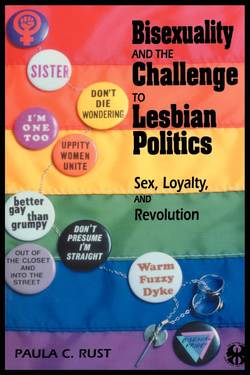Читать книгу Bisexuality and the Challenge to Lesbian Politics - Paula C Rust - Страница 32
На сайте Литреса книга снята с продажи.
Bisexuality as a Matter of Feelings
ОглавлениеAlthough the lesbians who participated in this study most commonly define bisexuality as a form of behavior, many are less concerned with actual behavior than with the feelings one has toward women and men. These lesbians define bisexuality as a matter of how one feels rather than how one behaves, and not surprisingly, they are more likely than lesbians who define bisexuality in terms of behavior to believe that bisexuality exists.2 Although there are some differences of opinion among them over exactly which feelings should be defined as bisexual, these differences are fewer and more trivial than those that exist among lesbians who define bisexuality behaviorally. Like the latter, they are concerned about bisexuality, but their concerns have a markedly different character.
Most lesbians who define bisexuality in terms of feelings simply referred to bisexual women as having “attractions” to women and men. Some respondents specified that they were referring to both emotional and physical attraction, or to emotional, social, and sexual attraction. Dorothea described attraction as “the range of feelings allowing us to be sexually and romantically involved with women and men.” Other respondents referred to “love,” “affectional preference,” or simply “feelings.”
For the most part, these differences appear to be merely differences in wording rather than differences of opinion. The only issue over which these lesbians are substantially divided is the question of whether bisexuals are those rare individuals whose feelings for women and men are exactly equal in strength and quality, or whether everyone who has feelings for both women and men should be considered bisexual:
I feel we all have varying degrees of attraction to both sexes, and maybe bisexual people really are equally attracted to both sexes . . . (Juanita)
I feel it is one aspect of the wide spectrum of human sexual identity. Just as there are women who are attracted to women, men to men, and women and men to each other to varying degrees, so there are also women and men who are attracted to both sexes to differing degrees. (Martha)
Lesbians like Juanita who define bisexuality in terms of equal attractions for women and men generally hold more negative attitudes toward bisexuals than lesbians like Martha who define bisexuality as a broader range of feelings toward both women and men. The former typically believe that while most people experience attractions toward both women and men, everyone or almost everyone has a preference one way or the other. They feel that people should identify themselves as lesbian or heterosexual according to their preferences, and many expressed antagonism or impatience with people who do not. In contrast, the latter are generally very tolerant or accepting of bisexuality. Those who define bisexuality as encompassing a broad range of varying feelings of attraction toward women and men disagree, however, on the issue of whether people with bisexual feelings should act on these feelings. Some believe that they should,
I don’t have any problems with it. If someone is attracted to both men and women, I think they should act upon it—it’s not healthy to hide feelings like that. (Frances)
whereas others believe that they should not.
Lesbians who define bisexuality in terms of a broad range of feelings toward women and men expressed concerns about bisexuality, but their concerns are very different from those expressed by lesbians who define bisexuality behaviorally. Instead of being concerned about bisexual women’s heterosexuality and integrity, they are concerned about the difficulties that bisexual women must face. These difficulties include personal problems, such as combining two very different types of love, and social hardships, such as a lack of acceptance by both the lesbian and heterosexual societies:
It must be very difficult to be a bisexual because of the tremendous difference between loving women and loving men. I have trouble understanding/relating to “bi’s.” (Georgia)
For persons attracted to both genders, I feel both envy and pity. They, in theory, could have the best of two worlds, but in reality, I fear usually neither gays or non-gays trust and accept them. (Abigail)
Many, like Georgia, confessed that they have difficulty understanding bisexuality, usually explaining that it is so removed from their own experience that they cannot relate to it. Some have trouble understanding attractions to men because they have never felt attracted to men themselves, whereas others have trouble understanding how people could be attracted to both sexes. Nevertheless, their comments convey a note of tolerance and even warmth that is generally lacking from the comments of those who define bisexuality in terms of behavior or in terms of equal attractions to women and men. For example, Thelma accepts what she cannot understand:
I feel accepting of my friends who identify themselves as bisexual. I don’t understand their ability to feel sexually attracted to and satisfied by both men and women. (Thelma)
In summary, lesbians who define bisexuality in terms of feelings of attraction toward women and men are divided over the question of whether bisexuality should be defined as an equal attraction toward women and men, or as a combination of attractions toward women and men of varying degrees. Lesbians who define bisexuality in terms of equal attractions generally take a dim view of people who call themselves bisexual because they believe that most people have a preference for either women or men and that most bisexual-identified people use the bisexual label to avoid admitting their true preference. Lesbians who define bisexuality in terms of a broader range of feelings are generally tolerant and accepting of bisexuality, however. They are concerned about the difficulties bisexuals face in a society that validates heterosexual and lesbian identities and lifestyles but condemns bisexuality, even though many admit that they cannot relate personally because they are not bisexual themselves.
